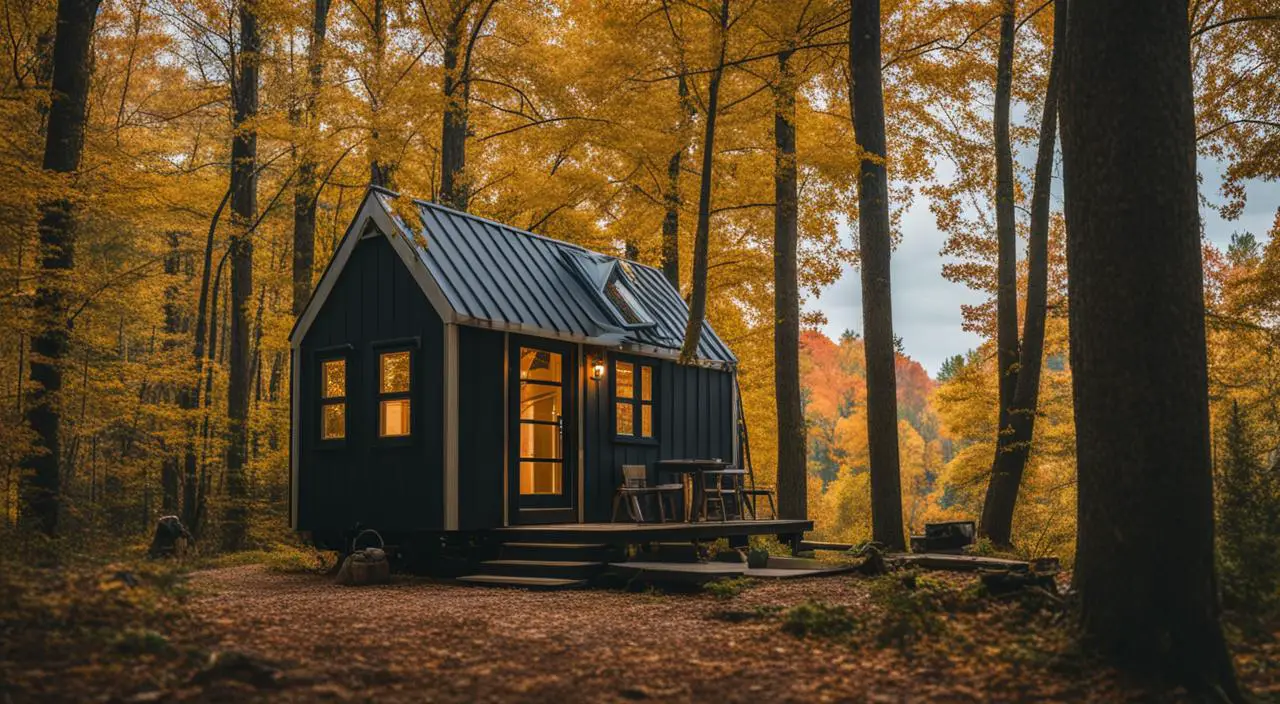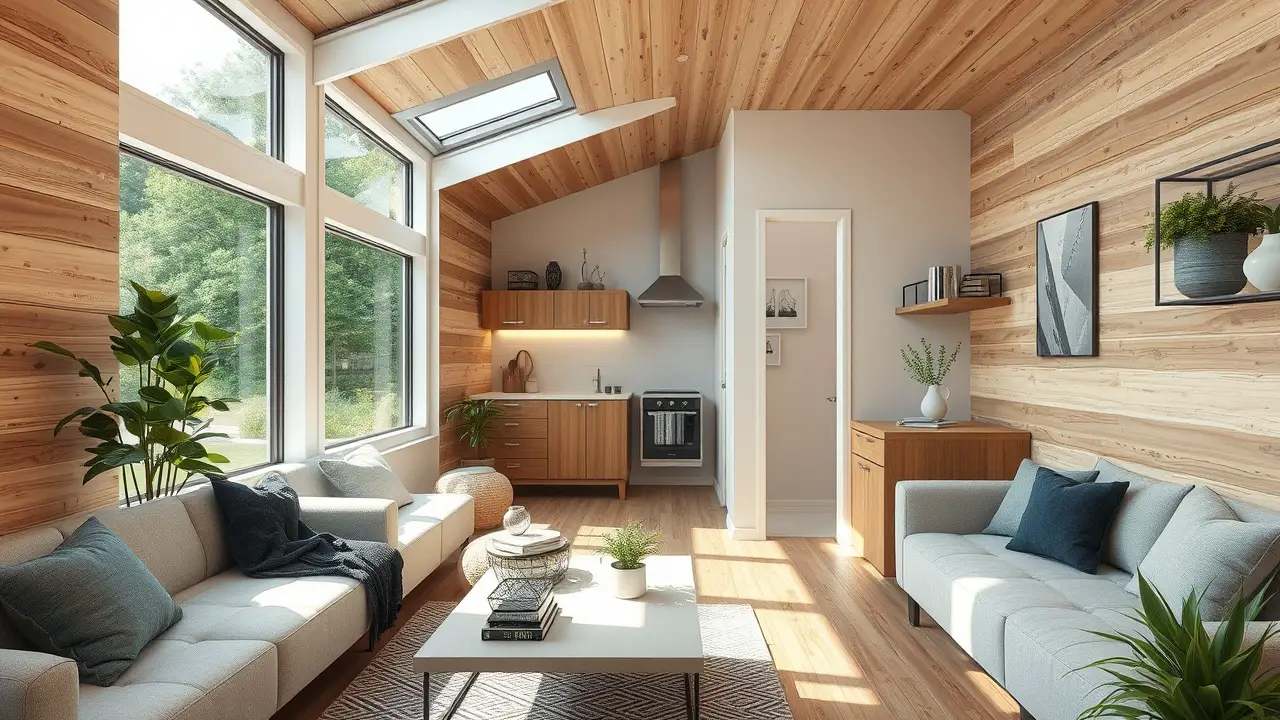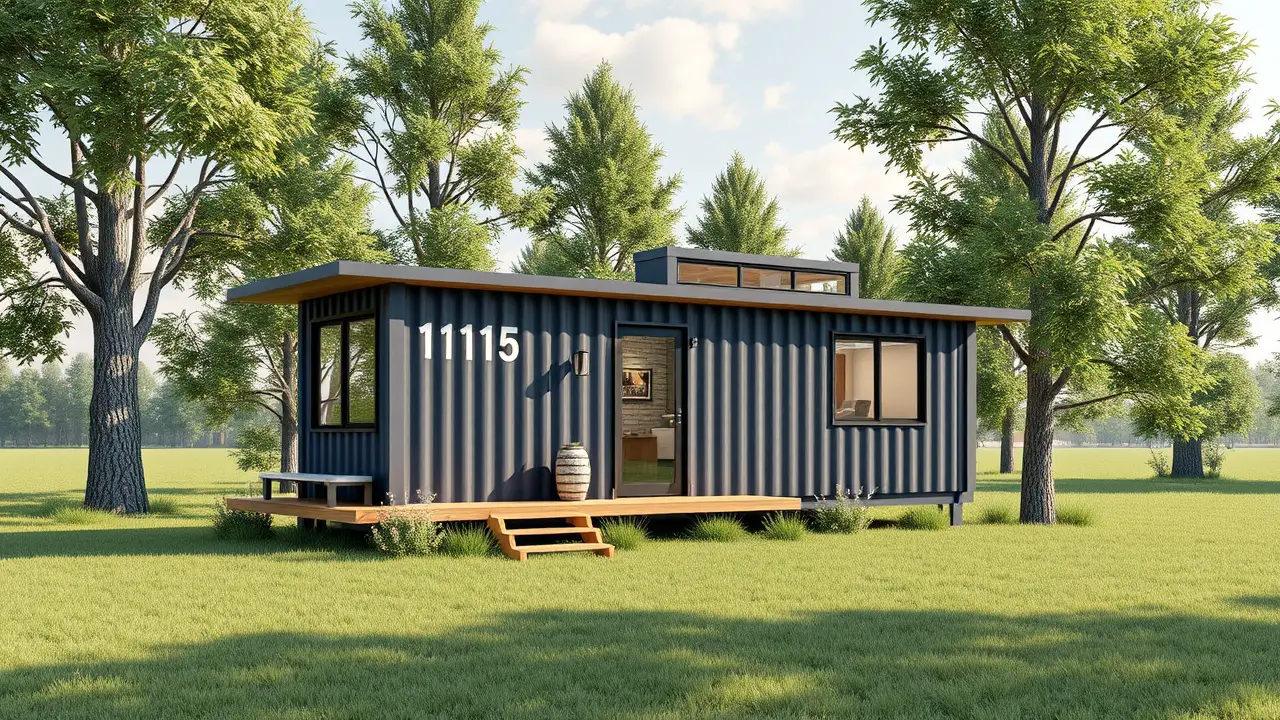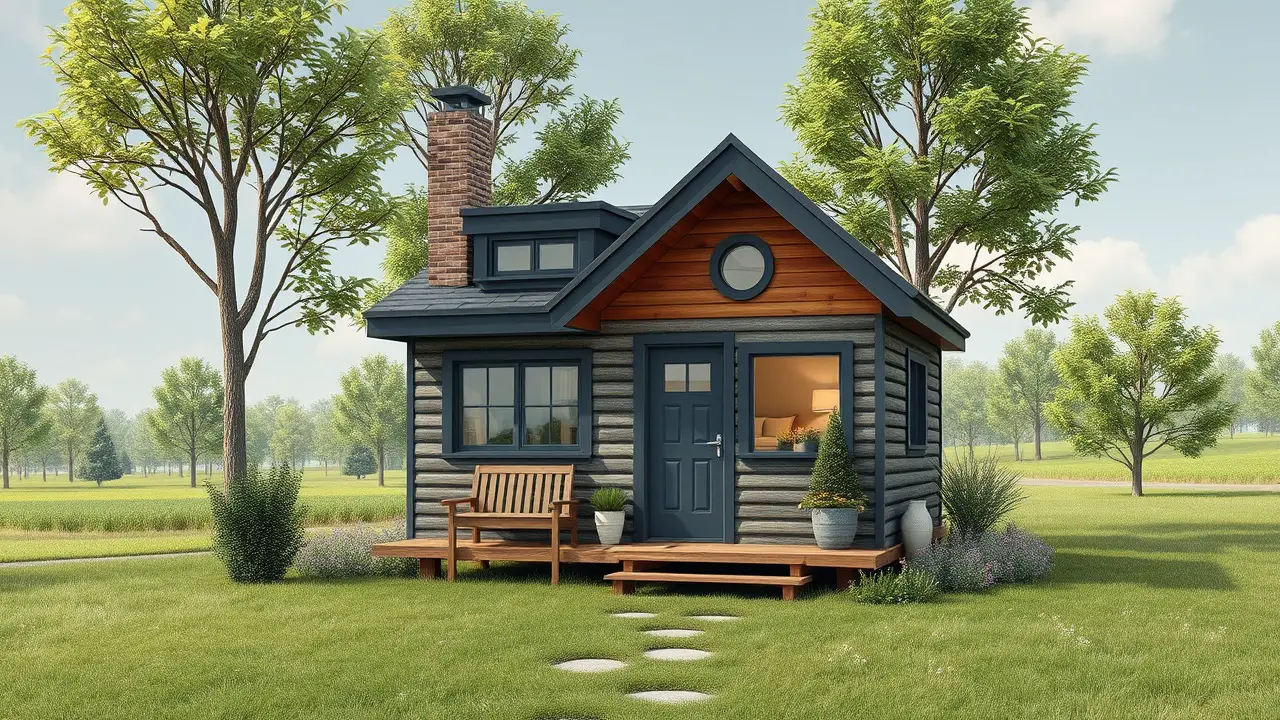Tiny house laws Michigan: Michigan, located in the Great Lakes region of the United States, has become a popular state for tiny house living. However, building and living in a tiny house comes with its own unique legal considerations and challenges.
Understanding the tiny house laws Michigan is crucial for individuals interested in pursuing this lifestyle.
Contents
In this comprehensive guide, we provide up-to-date information on the legal landscape of tiny house living in Michigan.
From understanding building codes to zoning requirements and regulations, this guide aims to help individuals navigate the complexities of tiny house laws in the state.
Tiny House Laws in Michigan: An Overview
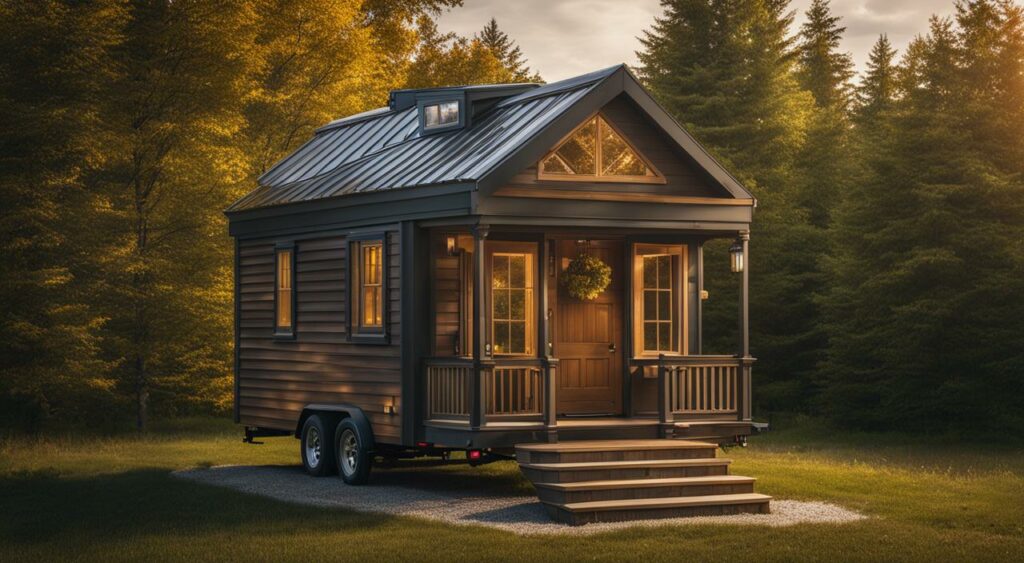
Michigan, like many other states, has its own set of laws and regulations surrounding tiny houses. It’s important to understand these laws before building or living in a tiny house to avoid legal issues.
In this section, we provide an overview of tiny house laws in Michigan and what individuals need to know.
Defining Tiny Houses in Michigan
Michigan defines a tiny house as a dwelling that is 400 square feet or less in size. This definition makes it clear that tiny houses are distinct from other types of dwellings, such as mobile homes or recreational vehicles.
Legal Considerations
Before building or living in a tiny house in Michigan, individuals need to be aware of legal considerations.
For example, they must adhere to building codes, zoning requirements, and regulations, which we will discuss in later sections. They also need to be aware of any restrictions on parking or minimum square footage in residential areas.
Building and Living in a Tiny House in Michigan
Building and living in a tiny house in Michigan is not without its challenges. However, there are many advantages to this lifestyle, including freedom from a mortgage and the ability to be mobile.
It’s essential to understand the legal landscape and comply with state and local regulations for a safe and sustainable tiny house experience.
To gain deeper insights into the legalities of tiny house living in Michigan, read on for a breakdown of building codes and regulations, zoning requirements, and legal considerations.
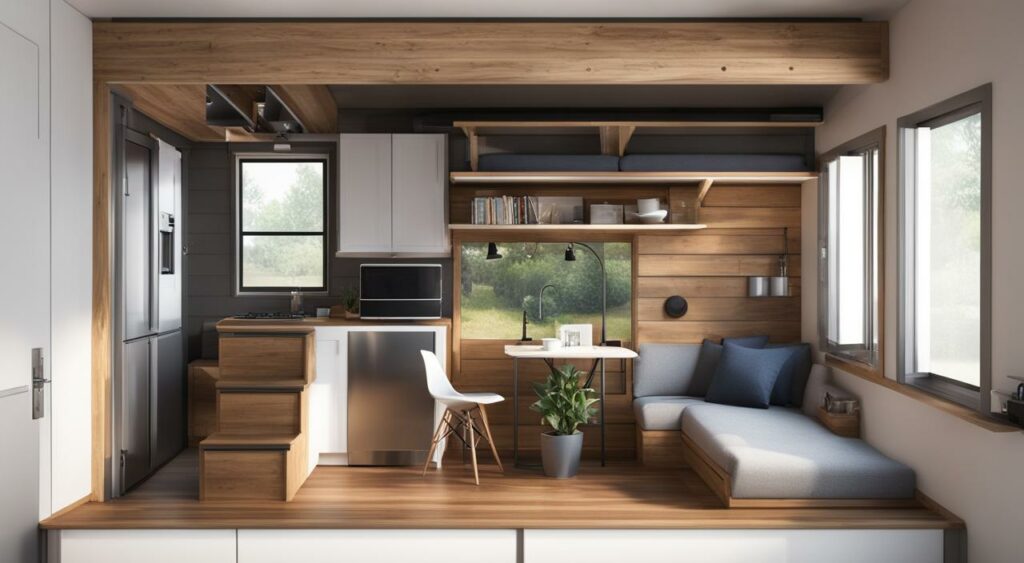
Building Codes and Regulations for Tiny Houses in Michigan
Michigan has specific building codes and regulations that govern the construction of tiny houses. These codes and regulations ensure that tiny houses are safe and habitable for individuals.
Individuals planning to build a tiny house in Michigan must follow these requirements to avoid legal issues and ensure the building is up to code.
Tiny House Regulations in Michigan:
- Michigan Building Code: Tiny houses must meet the Michigan Building Code, which includes an energy code and a residential code.
- Michigan Residential Code: The Michigan Residential Code provides specific requirements for the design and construction of residential buildings, including tiny houses. The code sets forth minimum standards related to plumbing, electrical, and mechanical systems.
- Michigan Energy Code: The Michigan Energy Code outlines the minimum requirements for energy-efficient design and construction of buildings, including tiny houses.
- Michigan Zoning Codes: Michigan has different zoning requirements for tiny houses depending on their location. Individuals must ensure they comply with zoning codes before constructing a tiny house.
Permits for Tiny Houses in Michigan:
Individuals planning to construct a tiny house in Michigan must obtain the necessary permits before beginning the construction process.
The state requires individuals to obtain a construction permit and an occupancy permit.
The construction permit ensures that the building complies with building codes and regulations, while the occupancy permit is required to move into the tiny house.
Tiny Home Restrictions in Michigan:
In Michigan, individuals must comply with the minimum size requirements for tiny houses, which is 70 square feet for a single person and 120 square feet for two people.
Additionally, individuals must comply with local zoning codes that may have further restrictions on the placement and size of tiny houses.
Michigan Tiny House Codes:
Michigan has specific codes that apply to tiny houses, including the Michigan Residential Code, the Michigan Energy Code, and the Michigan Building Code.
These codes outline the construction requirements for tiny houses, including plumbing, electrical, and mechanical systems, to ensure they are safe and habitable.
Zoning Rules for Tiny Homes in Michigan:
Michigan has specific zoning rules for tiny homes that individuals must follow.
These rules vary depending on the location of the tiny house and can include minimum square footage requirements, residential restrictions, and other legal requirements that individuals must comply with.
Table: Overview of Tiny House Regulations in Michigan
| Tiny House Regulations in MichiganDescription | |
|---|---|
| Michigan Building Code | Tiny houses must meet the Michigan Building Code, which includes an energy code and a residential code. |
| Michigan Residential Code | The Michigan Residential Code provides specific requirements for the design and construction of residential buildings, including tiny houses. |
| Michigan Energy Code | The Michigan Energy Code outlines the minimum requirements for energy-efficient design and construction of buildings, including tiny houses. |
| Michigan Zoning Codes | Michigan has different zoning requirements for tiny houses depending on their location. Individuals must ensure they comply with zoning codes before constructing a tiny house. |
| Permits for Tiny Houses in Michigan | Individuals planning to construct a tiny house in Michigan must obtain the necessary permits before beginning the construction process, including a construction permit and an occupancy permit. |
| Tiny Home Restrictions in Michigan | Michigan has restrictions on the size of tiny homes, which individuals must comply with. Local zoning codes may also have further restrictions on the placement and size of tiny homes. |
| Michigan Tiny House Codes | Michigan has specific codes that apply to tiny houses, including the Michigan Residential Code, the Michigan Energy Code, and the Michigan Building Code. |
| Zoning Rules for Tiny Homes in Michigan | Michigan has specific zoning rules for tiny homes that individuals must follow, including minimum square footage requirements and residential restrictions. |
Before building a tiny house in Michigan, individuals should consult with local authorities and familiarize themselves with the state’s codes and regulations to ensure a smooth and legal building process.
Zoning Laws and Requirements for Tiny Houses in Michigan
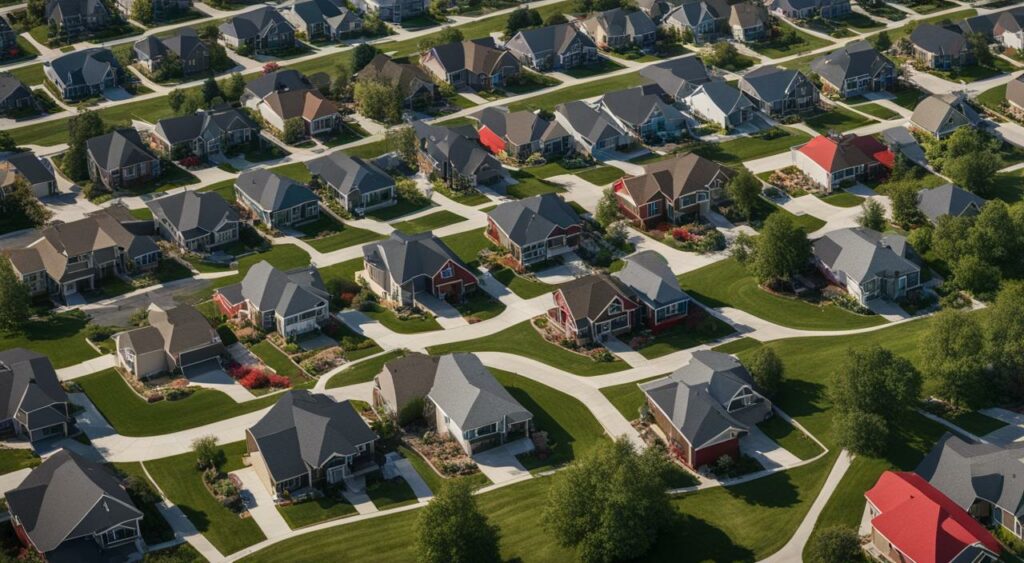
Zoning laws and regulations play a significant role in determining where tiny houses can be placed and what restrictions apply to them.
Understanding the zoning requirements for tiny houses in Michigan is crucial for individuals looking to build or live in a tiny house.
Tiny House on Wheels Laws in Michigan
In Michigan, tiny houses on wheels are typically considered recreational vehicles and are subject to the regulations put in place by the Michigan Department of Transportation.
This means that unless you plan to permanently affix your tiny house to a foundation, it should comply with the regulations for RVs, including size limitations and roadworthiness standards.
Minimum Size Requirements for Tiny Houses in Michigan
Michigan does not have a minimum size requirement for houses, but it does have a requirement for habitable rooms. A habitable room must be at least 70 square feet in area, with minimum dimensions of 7 feet in any horizontal direction.
Residential Restrictions for Tiny Houses in Michigan
Michigan residents must comply with local regulations regarding dwelling units, which may include specific requirements for minimum square footage, setback requirements, and building codes.
Legal Requirements for Tiny Houses in Michigan
The legal requirements for tiny houses in Michigan depend on the location and intended use of the tiny house.
In general, if the tiny house is intended to be used as a permanent residence, it must comply with local laws and regulations regarding dwellings.
This includes obtaining the necessary permits and approvals, complying with building codes, and paying property taxes.
Zoning Regulations for Tiny Homes in Michigan
The zoning regulations for tiny homes in Michigan vary depending on the location.
In some areas, tiny homes may be allowed in residential areas, while in others, they may only be permitted in designated zones, such as manufactured home parks or campgrounds.
Permit Process for Tiny Homes in Michigan
The permit process for tiny homes in Michigan varies depending on the location and requirements set forth by local and state authorities.
Generally, individuals will need to obtain building permits, zoning permits, and other approvals before constructing or locating a tiny home in Michigan.
Local Ordinances for Tiny House Living in Michigan
Many local jurisdictions in Michigan have additional ordinances that regulate various aspects of tiny house living, such as minimum square footage requirements, setbacks from property lines, and occupancy limits.
It is important to check with local authorities to ensure compliance with all relevant regulations.
State Laws for Tiny House Construction in Michigan
Michigan does not have specific state laws regarding the construction of tiny houses. However, the Michigan Residential Code may apply to certain aspects of the construction process, such as plumbing and electrical systems.
Minimum Square Footage for Tiny Homes in Michigan
Michigan does not have a minimum square footage requirement for dwellings, but the local jurisdiction may set a minimum square footage requirement for residential units.
Restrictions on Tiny Houses in Michigan
Restrictions on tiny houses in Michigan can vary depending on the local jurisdiction. Some common restrictions include limits on the number of occupants, setbacks from property lines, and minimum square footage requirements.
Regulations on Tiny House Parking in Michigan
Tiny house parking regulations in Michigan vary depending on the location. In general, parking a tiny house in a residential area may require compliance with local zoning regulations and building codes.
In some cases, it may be easier to park a tiny house in a designated area, such as a campground or RV park.
Legal Considerations for Tiny House Living in Michigan
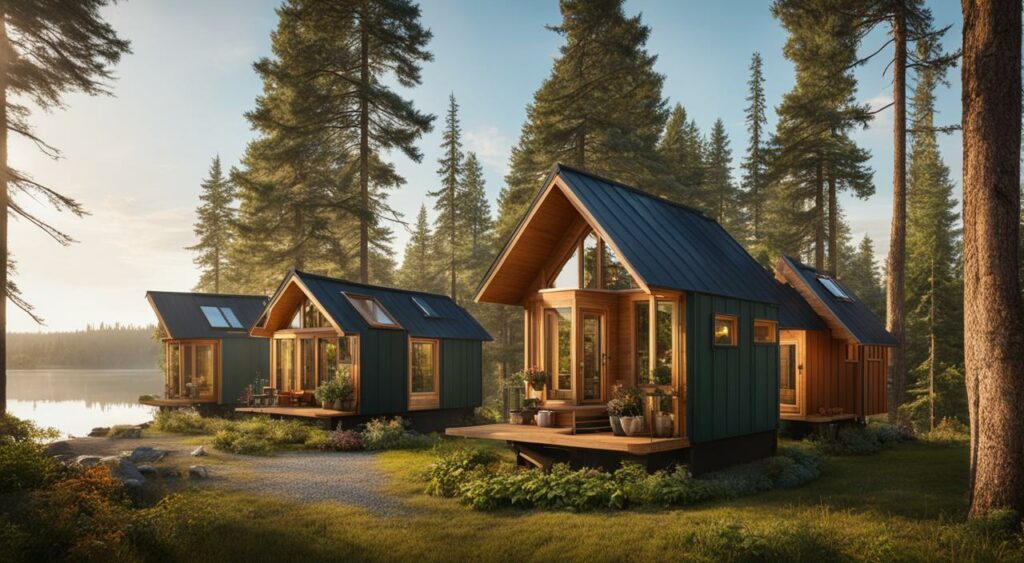
Living in a tiny house in Michigan comes with its own set of legal considerations.
Zoning Regulations for Tiny Homes in Michigan
Zoning laws play a crucial role in determining where tiny houses can be located in Michigan. Individuals need to be aware of the restrictions imposed by the state and local authorities.
Michigan zoning regulations specify that tiny houses must be placed in areas where conventional homes are allowed.
Individuals should also be aware of the zoning rules for tiny house parking and minimum square footage requirements.
Permits for Tiny House Construction in Michigan
Building a tiny house in Michigan requires obtaining the necessary permits and approvals. These permits could be at the state or local level, depending on the jurisdiction.
Individuals must be aware of the legal requirements for obtaining a permit, including the submission of detailed architectural plans, site plans, and other documents.
Michigan tiny home regulations specify that individuals must also undergo building inspections to ensure that the tiny house is up to code.
Michigan Tiny House Zoning Laws
Michigan state laws for tiny homes specify that any primary dwelling must comply with the state’s building codes and regulations.
Michigan zoning laws dictate that individuals are not allowed to park their tiny houses on vacant land or use them as permanent residences in areas classified as recreational zones.
Tiny House Communities in Michigan
Michigan is home to various tiny house communities, offering a unique and sustainable way of living. These communities operate under specific legal frameworks and are subject to zoning rules and building codes.
Individuals interested in joining a tiny house community in Michigan should research the legal requirements and regulations that apply.
Michigan Tiny House Living and the Tiny House Movement
The tiny house movement in Michigan is gaining traction, with more individuals embracing the principles of minimalism and sustainable living.
Michigan tiny home regulations and zoning laws reflect this growing trend and provide a legal framework for tiny house living.
The Role of the Michigan Legislative Council in Tiny House Laws
The Michigan Legislative Council plays a crucial role in shaping and updating the laws and regulations that govern tiny houses in the state.
As the legislative research and administrative support arm of the Michigan Legislature, the council assists lawmakers by providing research, legal analysis, and other support services.
When it comes to tiny house legislation, the Michigan Legislative Council works closely with the Michigan House of Representatives and the Michigan Senate to develop and update laws that affect the construction and occupancy of tiny houses.
The council also plays a key role in reviewing and analyzing proposed bills related to tiny houses, ensuring that they align with existing laws and regulations and recommending changes where necessary.
The Rules of the Michigan Legislative Council
The Michigan Legislative Council operates according to a set of rules and procedures that govern its operations.
These rules outline the council’s responsibilities, including its role in reviewing and analyzing legislation related to tiny houses.
Under these rules, the council is responsible for providing legislators with analyses of proposed bills, including their potential impacts on Michigan residents and businesses.
The council may also recommend changes to proposed bills to ensure that they are legally sound and in line with existing regulations.
The Michigan House of Representatives and Michigan Senate
The Michigan House of Representatives and Michigan Senate play a crucial role in the creation and updating of laws related to tiny houses.
Members of these bodies introduce bills related to tiny house construction and occupancy, and work with the Michigan Legislative Council to review and analyze proposed legislation.
Once a bill has been approved by both houses of the Michigan Legislature, it is sent to the Governor of Michigan for consideration and signature. If the governor approves the bill, it becomes law.
Resources for Understanding Tiny House Laws in Michigan
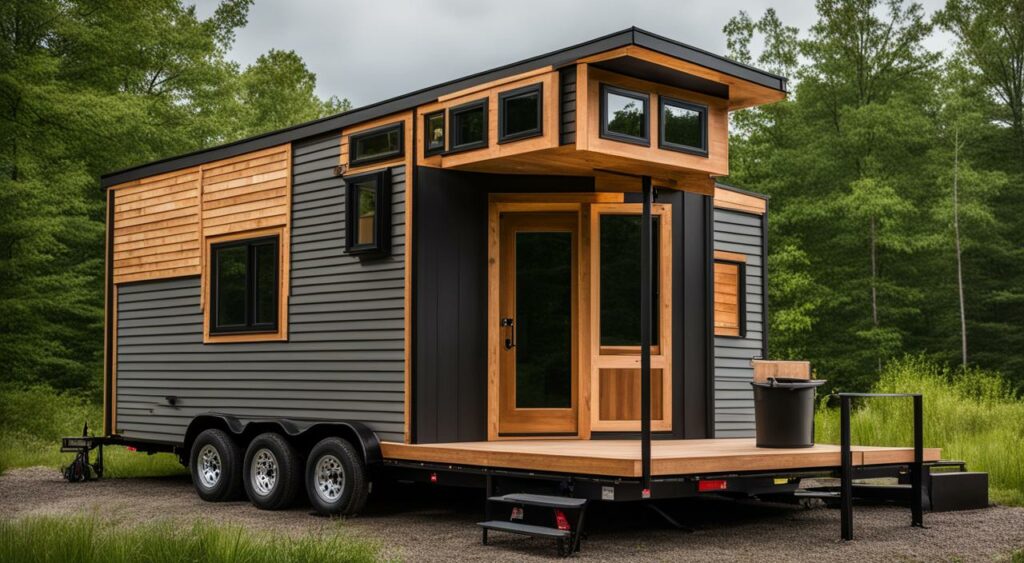
If you’re interested in building or living in a tiny house in Michigan, it’s essential to understand the legal requirements and regulations that come with it.
Fortunately, there are many resources available to help you navigate the complex legal landscape of tiny house living in the state.
Government Websites
The state of Michigan provides comprehensive information on tiny house regulations, codes, and zoning requirements on its official website.
The website has detailed guides on building codes, permits, and zoning requirements in various counties and cities.
Additionally, for more information on state legislation, the official website of the Michigan Legislature features a wide range of information on current laws and proposed regulations related to tiny houses and other types of dwellings.
Official Documents
Michigan has several official documents that provide information and guidance on tiny house laws in the state.
These documents include the Michigan Residential Code, which outlines the building codes and regulations for all types of residential structures, including tiny houses.
The Michigan Zoning Enabling Act and the Michigan Home Rule City Act provide guidelines on zoning requirements and regulations in the state.
Tiny House Communities
One of the best ways to learn about tiny houses in Michigan is to visit a tiny house community. These communities offer a unique opportunity to see and experience tiny house living firsthand.
Some popular tiny house communities in Michigan include the Tiny House Village at Crooked River Resort and the Traverse Bay RV Resort.
Non-Profit Organizations
Several non-profit organizations in Michigan offer resources and support for individuals interested in building or living in a tiny house.
Association is a non-profit organization that provides information and guidance on the legal and practical aspects of tiny house living in the state.
Other organizations include Tiny House Detroit and Michigan Tiny House Solutions.
It’s important to do your research and fully understand the legal requirements and regulations before building or living in a tiny house in Michigan. By utilizing the resources available, you can ensure a safe, compliant, and enjoyable tiny house experience.
Frequently Asked Questions About Tiny House Laws in Michigan
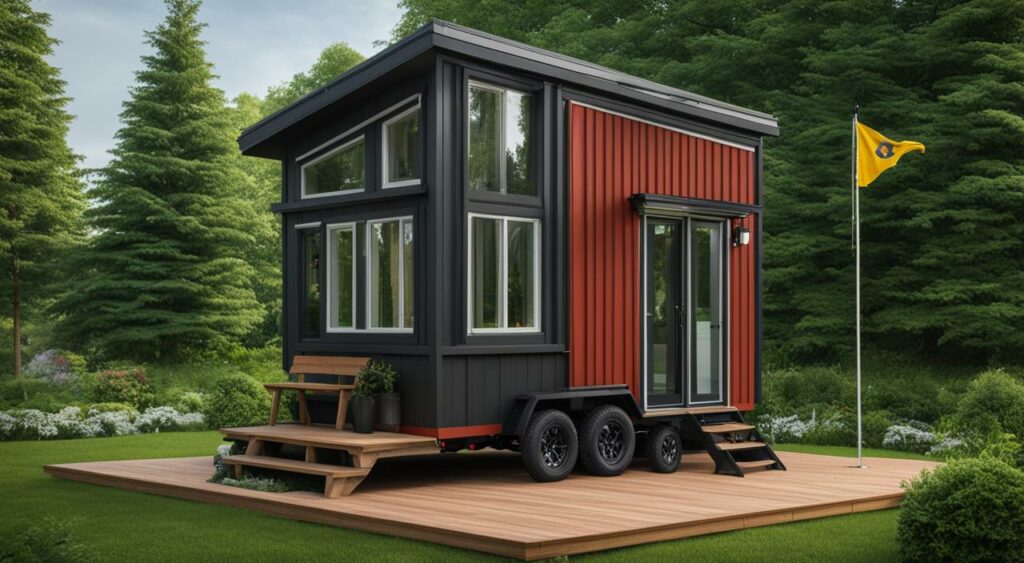
Individuals interested in tiny house living in Michigan often have questions about the legal requirements and restrictions.
This section addresses some of the most frequently asked questions related to tiny house laws in Michigan:
Is it legal to put a tiny house in your backyard?
The legality of placing a tiny house in a backyard in Michigan depends on various factors, such as the zoning regulations and building codes in the specific location.
Generally, backyard tiny houses may be subject to residential restrictions and minimum size requirements.
Thus, it is important to consult with local authorities and adhere to relevant legal requirements before placing a tiny house in a backyard.
Are tiny houses legal in Michigan?
Yes, tiny houses are legal in Michigan, provided that they meet the state and local regulations and requirements. Building a tiny house without proper permits and approvals can result in legal issues and fines.
What are the current and upcoming tiny house laws in Michigan?
The current tiny house laws in Michigan include building codes and zoning regulations that apply to all types of dwellings, including tiny houses.
There are no specific laws that only pertain to tiny houses in the state.
Future developments in tiny house legislation in Michigan remain uncertain, although individuals can stay updated on related legislative proposals and changes through government websites and other resources.
What are the legal requirements for tiny houses in Michigan?
The legal requirements for tiny houses in Michigan include compliance with the state and local building codes, zoning regulations, and permit processes.
These requirements vary depending on factors such as the location, size, and type of the tiny house. Additionally, residential restrictions, minimum size requirements, and other regulations may also apply.
What are the zoning codes for tiny homes in Michigan?
The zoning codes for tiny homes in Michigan depend on the location and specific zoning district. Zoning requirements may dictate the size, location, and use of the tiny house and may also include setbacks, parking restrictions, and other regulations.
It is crucial to consult with local authorities to determine the relevant zoning requirements for a particular location.
What are the building codes for tiny houses in Michigan?
The building codes for tiny houses in Michigan include the state building code, which sets forth the minimum standards for construction, electrical, mechanical, and plumbing systems.
Additionally, local building codes may also apply, depending on the specific location. It is important to consult with local building authorities to ensure compliance with all relevant building codes and regulations.
Does Michigan allow tiny homes?
Yes, Michigan allows tiny homes, provided that they comply with relevant state and local regulations and requirements.
However, it is important to note that Michigan does not have specific laws that only apply to tiny houses, and compliance with building codes and zoning regulations is required.
What are the restrictions on tiny houses in Michigan?
The restrictions on tiny houses in Michigan include compliance with building codes, zoning regulations, and other legal requirements.
Residential restrictions, minimum size requirements, and parking restrictions may also apply, depending on the specific location and zoning district.
Consultation with local authorities is crucial in determining the relevant restrictions for a particular location.
The Importance of Complying with Tiny House Laws in Michigan
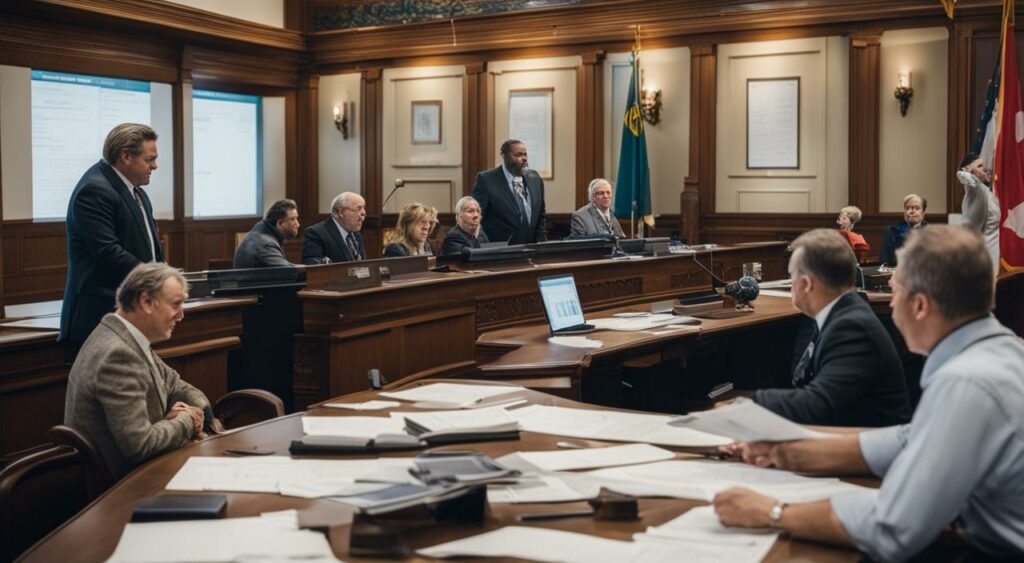
Living in a legally compliant tiny house in Michigan requires individuals to adhere to specific requirements and regulations set forth by the state and local authorities.
Failure to comply with these laws can result in legal consequences, including fines and even the removal of the tiny house.
It is crucial to understand the legal landscape of tiny house living in Michigan and ensure compliance with the rules and regulations.
This includes familiarizing oneself with the legislative measures, senate bills, and county ordinances that impact tiny house living in the state.
The Michigan legislature, for instance, defines the minimum square footage for a dwelling unit, and building a tiny house below this threshold would violate state law.
Additionally, local zoning codes may restrict where tiny houses can be located, while other regulations may define the necessary permits and inspections required to construct a legal and safe tiny house.
Therefore, it is essential to research and understand the legal requirements and legislative acts for building and living in tiny houses in Michigan to ensure a compliant and legal experience.
Michigan Legislative Council and Tiny House Laws
The Michigan Legislative Council has a critical role in developing and updating the legal framework governing tiny house living in the state.
Its work includes analyzing and implementing legislative measures that define the minimum standards for safe and sustainable living in tiny houses.
The council collaborates with state and county authorities to update the zoning regulations, building codes, and other requirements that govern tiny house construction and living in Michigan.
Staying up-to-date with the council’s work is crucial for individuals interested in building or living in a tiny house in the state.
Compliance with Tiny House Laws in Michigan
Compliance with tiny house laws is essential to avoid legal issues and ensure a safe and sustainable living environment.
Living in a tiny house that meets the legal requirements and standards set by the state and local authorities guarantees a more comfortable and stress-free living experience.
In summary, adhering to the legal requirements and regulations for building and living in tiny houses in Michigan is vital to ensure a compliant, safe, and legal tiny house experience.
It is essential to stay informed about the legislative changes and collaborate with the relevant authorities to guarantee a successful tiny house living experience.
Navigating the Permit Process for Building a Tiny House in Michigan
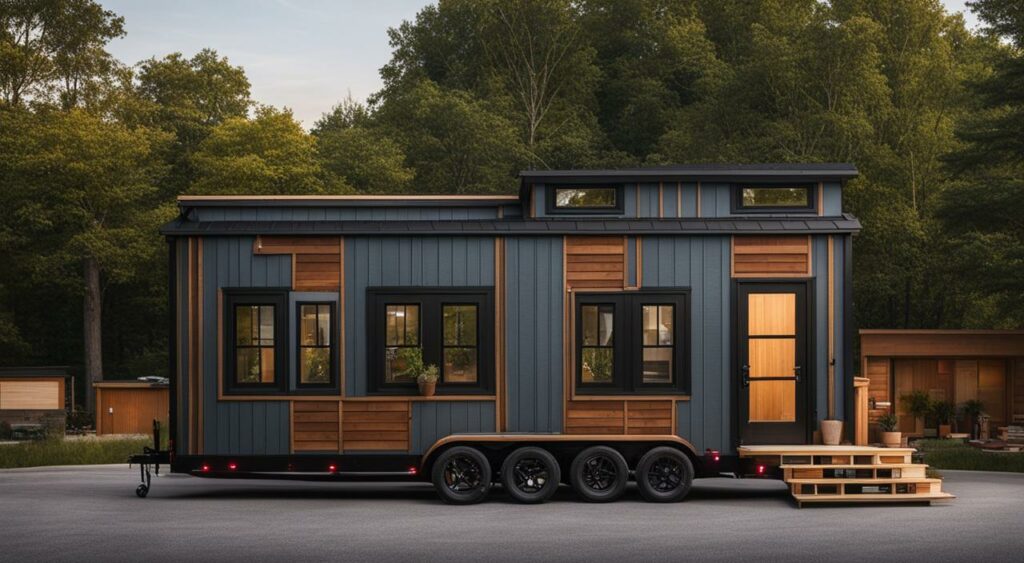
Building a tiny house in Michigan requires individuals to obtain necessary permits and approvals. The process can be complex, and it is essential to follow all legal regulations to ensure a successful build.
To begin, individuals will need to apply for a building permit from the local building department. This permit is necessary to ensure that the tiny house is constructed according to the state’s building codes and regulations.
In addition to the building permit, individuals may also need to obtain additional permits, such as electric or plumbing permits, depending on the tiny house’s specifications.
During the permit process, individuals will typically need to provide detailed construction plans, site plans, and specifications for the tiny house.
The building department will review these plans and specifications to ensure that they meet all applicable codes and regulations.
Once the plans have been approved, individuals can begin the construction process.
However, it is important to note that building inspections will be required periodically throughout the construction process to ensure that the tiny house is being built according to the approved plans and that it meets all safety standards.
After the construction is complete, a final inspection will be conducted to ensure that the tiny house meets all building code requirements and regulations.
Once the final inspection is passed, and all necessary permits and approvals have been obtained, the tiny house can be occupied as a dwelling.
In summary, navigating the permit process for building a tiny house in Michigan requires individuals to be familiar with all relevant building codes, regulations, and requirements.
By following the permit process and obtaining all necessary permits and approvals, individuals can ensure a legally compliant and safe construction of their tiny house.
Exploring Tiny House Communities in Michigan
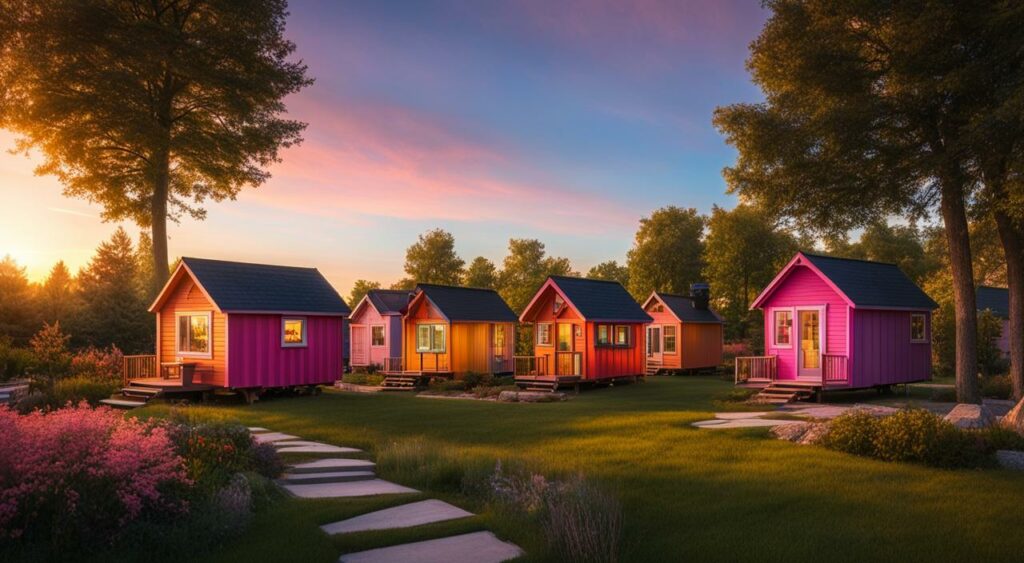
Michigan is home to several tiny house communities that offer a unique and sustainable living experience for individuals interested in this lifestyle.
These communities typically feature a cluster of individual tiny houses, each with its own unique design and style.
However, living in a tiny house community comes with its own set of legal considerations, especially when it comes to zoning laws and building codes.
The Legal Landscape of Tiny House Communities in Michigan
The state of Michigan does not have specific laws or regulations pertaining to tiny house communities. However, these communities must adhere to the same building codes and zoning regulations as any other residential development.
This means that individuals looking to build or live in a tiny house community must ensure that the development complies with all relevant state and local laws.
Michigan has specific laws regarding tiny houses on wheels, which may impact the legal status of tiny house communities depending on whether the tiny houses are classified as permanent or temporary structures.
In addition, each county in Michigan has its own zoning regulations and building codes that must be followed, which can vary significantly between different regions of the state.
Popular Tiny House Communities in Michigan
One popular tiny house community in Michigan is the 28th Street Apartments in Grand Rapids. This community features 12 individual tiny houses, each with its own unique design, and is located near major shopping centers and restaurants.
Another community is the Traverse Bay Resort Tiny Home Village in Traverse City.
This community has 10 individual tiny houses available for rent, each with access to the resort’s amenities such as a fitness center, pool, and lakefront beach.
The Sanctuary in Cleveland is another popular tiny house community in Michigan, featuring four individual tiny houses nestled in a peaceful wooded setting.
The Benefits of Living in a Tiny House Community
Living in a tiny house community offers several benefits beyond just the unique living experience.
These communities often provide a strong sense of community and support, with shared outdoor areas and communal spaces that allow residents to interact and connect with each other.
They also typically offer more affordable housing options compared to traditional homes, which can be especially appealing for those looking to downsize or simplify their lives.

Conclusion
Living in a tiny house in Michigan is an exciting prospect for individuals looking to embrace sustainable and minimalist living.
However, to ensure a successful and legally compliant tiny house experience, individuals must understand and adhere to the tiny house legislation in the state.
By familiarizing themselves with the specific building codes, zoning regulations, and legal requirements, individuals can navigate the legal landscape and avoid legal troubles.
It is also crucial to comply with the permit process while building a tiny house in Michigan to ensure a compliant and legal construction.
Michigan is home to various tiny house communities that promote sustainable living and offer unique living experiences.
However, individuals must understand the tiny house legislation that governs living in these communities to ensure a hassle-free living experience.
The Michigan Legislative Council is continually working towards updating the tiny house legislation to accommodate the growing tiny house movement in the state.
Therefore, individuals must stay informed with the latest updates to comply with the changes and ensure a legally compliant tiny house experience in Michigan.

